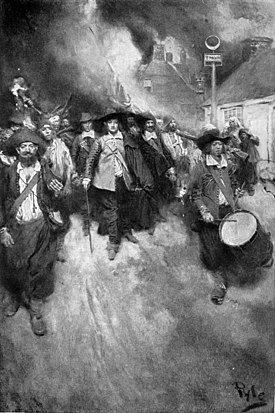Bacon's Rebellion
| Bacon's Rebellion | |||
|---|---|---|---|

The Burning of Jamestown by Howard Pyle, c. 1905.
|
|||
| Date | 1676 | ||
| Location | Jamestown, Colony of Virginia | ||
| Goals | Change in Virginia's Indian-Frontier policy | ||
| Methods | Demonstrations, vigilantes | ||
| Parties to the civil conflict | |||
|
|||
| Lead figures | |||
|
|
|||
| Arrests, etc | |||
|
|||
Bacon's Rebellion was an armed rebellion in 1676 by Virginia settlers led by Nathaniel Bacon against the rule of Governor William Berkeley. The colony's dismissive policy as it related to the political challenges of its western frontier, along with other challenges including leaving Bacon out of his inner circle, refusing to allow Bacon to be a part of his fur trade with the Indians, and Doeg Indian attacks, helped to motivate a popular uprising against Berkeley, who had failed to address the demands of the colonists regarding their safety.
A thousand Virginians of all classes and races rose up in arms against Berkeley, attacking Indians, chasing Berkeley from Jamestown, Virginia, and ultimately torching the capital. The rebellion was first suppressed by a few armed merchant ships from London whose captains sided with Berkeley and the loyalists. Government forces from England arrived soon after and spent several years defeating pockets of resistance and reforming the colonial government to be once more under direct royal control.
It was the first rebellion in the American colonies in which discontented frontiersmen took part. A similar uprising in Maryland took place later that year. The alliance between indentured servants and Africans (most enslaved until death or freed), united by their bond-servitude, disturbed the ruling class, who responded by hardening the racial caste of slavery in an attempt to divide the two races from subsequent united uprisings with the passage of the Virginia Slave Codes of 1705. While the farmers did not succeed in their initial goal of driving the Indians from Virginia, the rebellion did result in Berkeley being recalled to England.
The immediate cause of the rebellion was Governor William Berkeley's refusal to retaliate for a series of Indian attacks on frontier settlements. In addition, many colonists wished to push westward to claim Indian frontier land, but they were denied permission by Gov. Berkeley.
Modern historians have suggested it may have been a power play by Bacon against Berkeley and his favoritism towards certain members of court. Bacon's financial backers included men of wealth from outside Berkeley's circle of influence.
...
Wikipedia
